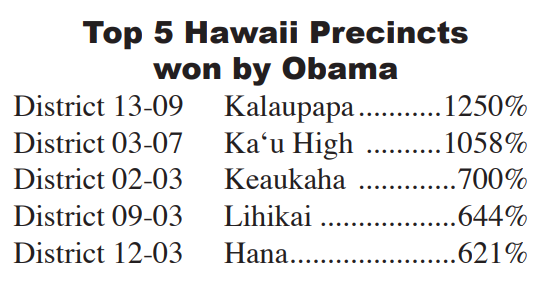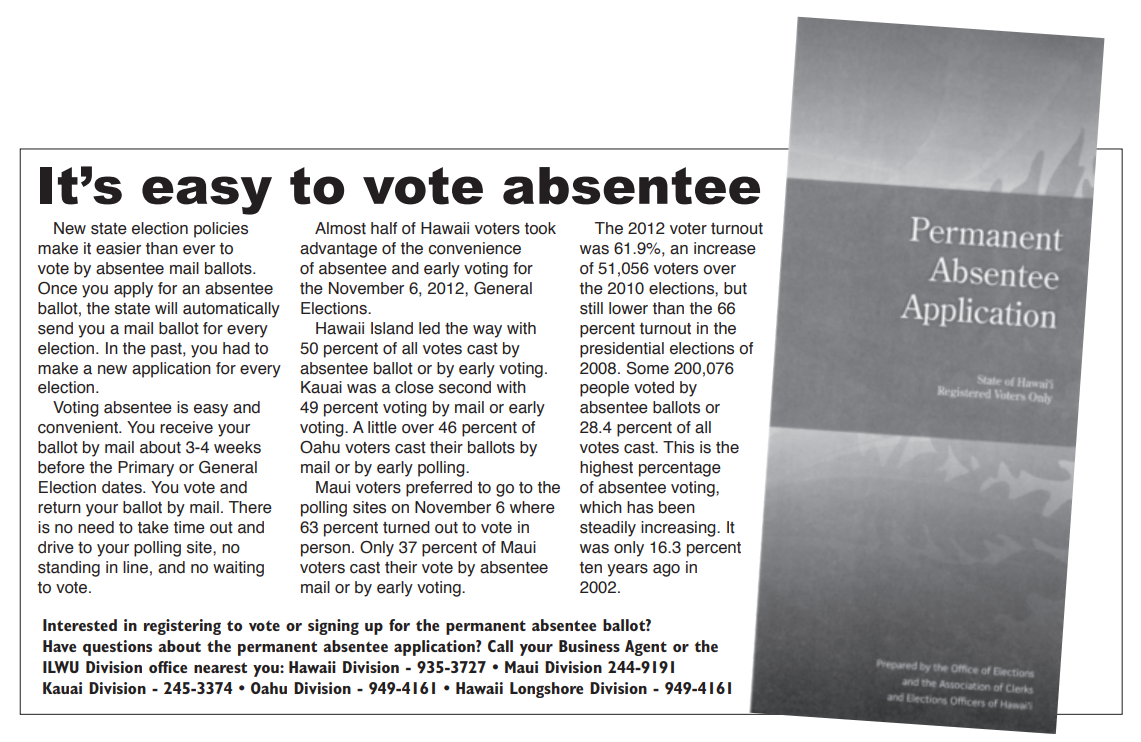American voters sent a loud and clear message that they support President Obama’s and the Democratic Party’s policies and rejected the Republican Party’s philosophy and programs.
American voters chose to move forward with Obama’s program of affordable health care; of increasing the top tax rates so the super wealthy must pay their fair share of taxes; of promoting sustainable energy and protecting the environment; of preventing the financial abuse of the big banks and Wall Street money machines; of investing in American jobs by repairing our highways, bridges, and mass transportation; of equal rights for all people, regardless of sexual orientation or national origin.
American voters rejected Mitt Romney’s and the Republican Party’s policies that sought to go backwards. They wanted to turn America back to the past where the super wealthy continue to pay lower taxes than working people; where banks and financial companies can continue to gamble with our economy and security; where they would cut programs such as Medicare and Medicaid; where immigrants would be discriminated against; where environmental, labor, and health regulations would be eliminated or weakened.
Obama won with a decisive 332 to 206 electoral votes or 62% to 38%. Obama won 51% of the popular vote compared with 48% won by Mitt Romney. Exit polls revealed that Obama won 73% of the Asian vote; 71% of the Hispanic vote; 93% of the Black vote; and 55% of women voters. The only group Mitt Romney won was among white men, where he got 65% of the vote.
In Hawaii, Obama won by a stunning margin of 70.1% of the vote compared to 27.7% won by Romney. This was the highest margin of any state. Only the District of Columbia gave Obama a higher margin where he received 91.4% of the vote and Romney received only 7.1% of the vote. In Hawaii, Obama won 232 precincts and lost only one precinct, Kahuku—District 47 Precinct 3
The Democratic victory extended beyond the presidential race. The Democrats gained two Senate seats and eight additional seats in the House of Representatives. The Democrats will have a larger majority in the Senate where they will now have 53 seats plus 2 independents who will caucus with the Democrats. The Republicans will have 45 Senators.
When the new House of Representative members are sworn into office in 2013, the Democrats will have 201 seats. The Republicans will still ho
Looking Forward
President Obama will have four more years in office, which will have far reaching impact on working people. Obama may appoint as many as two justices to the US Supreme Court which will swing the Court from a Conservative majority to a more progressive majority. Obama will be able to appoint pro-labor members to the National Labor Relations Board which will uphold the rights of workers to organize into unions. Obama will also be able to appoint the people who will run important government agencies such as the Department of Labor, Environmental Protection Agency, Health and Education, Transportation and others.

Thanks to you—a big victory for union political action
In the Hawaii elections, nearly every ILWU endorsed candidate won their election.
The most significant wins were Mazie Hirono’s victory over Linda Lingle for Daniel Akaka’s Senate seat; Colleen Hanabusa’s defeat of Republican challenger Charles Djou for the House of Representative District 1; and Tulsi Gabbard’s win over Kawika Crowley for the House District 2 seat. For the first time Hawaii will have elected a woman to the U.S. Senate and Hawaii’s Congressional team will have three women. Hawaii’s senior U.S. Senator Daniel K. Inouye passed away on December 17, and Hawaii Lt. Governor Brian Schatz has been appointed to take his place
Mazie Hirono beat Linda Lingle by over 108,000 votes. Hirono won 235 out of 249 precincts, while Lingle won only 12 precincts. (They were tied in one precinct.) The Lingle campaign and outside groups such as the US Chamber of Commerce spent millions of dollars on television ads which attacked Hirono and showed Lingle with a puppy and lots of smiling children.
Both Lingle and Charles Djou tried to present themselves as a nice person and an effective leader who will work with both parties, Hawaii voters were not fooled and remembered how Governor Lingle refused to work with Democrats in the Hawaii Legislature and vetoed dozens of bills passed by the Democratic majority. Hawaii voters remembered how Charles Djou voted the Republican Party line for the seven months he served in the U.S. House of Representatives. Djou had won the special election in May 2010 to the seat vacated by Neil Abercrombie who resigned to run for Governor of Hawaii.
Honolulu voters also reaffirmed their support of the rail system by electing Kirk Caldwell over former Governor Benjamin Cayetano who campaigned on a promise to stop the rail. Anti-rail council member Tom Berg was defeated by Kymberly Pine and Carol Fukunaga was elected to the City and County of Honolulu Council over anti-rail candidate Sam Aiona and others.
The ILWU supported 14 Hawaii Senate candidates and lost only one race where Democrat Kurt Lajala challenged incumbent Republican Sam Slom. (Another 10 senators won their primary elections and were not on the General Election ballot.) The Senate will now have 24 Democrats and one Republican.
The ILWU supported 28 candidates running in the State House of Representatives—17 House members won their primary elections and the union did not endorse candidates in 6 races. Only two of our candidates lost—incumbent Democrat Marilyn Lee lost to Republican Beth Fukumoto in District 36-Mililani and Democrat Jake Bradshaw lost to Republican Lauren Cheape in a close race for the open seat in District 45-Waialua. Going into the elections, Republicans held 8 seats to 43. After the elections, they will hold 7 seats and Democrats will hold 44 seats in the Hawaii Legislature.

